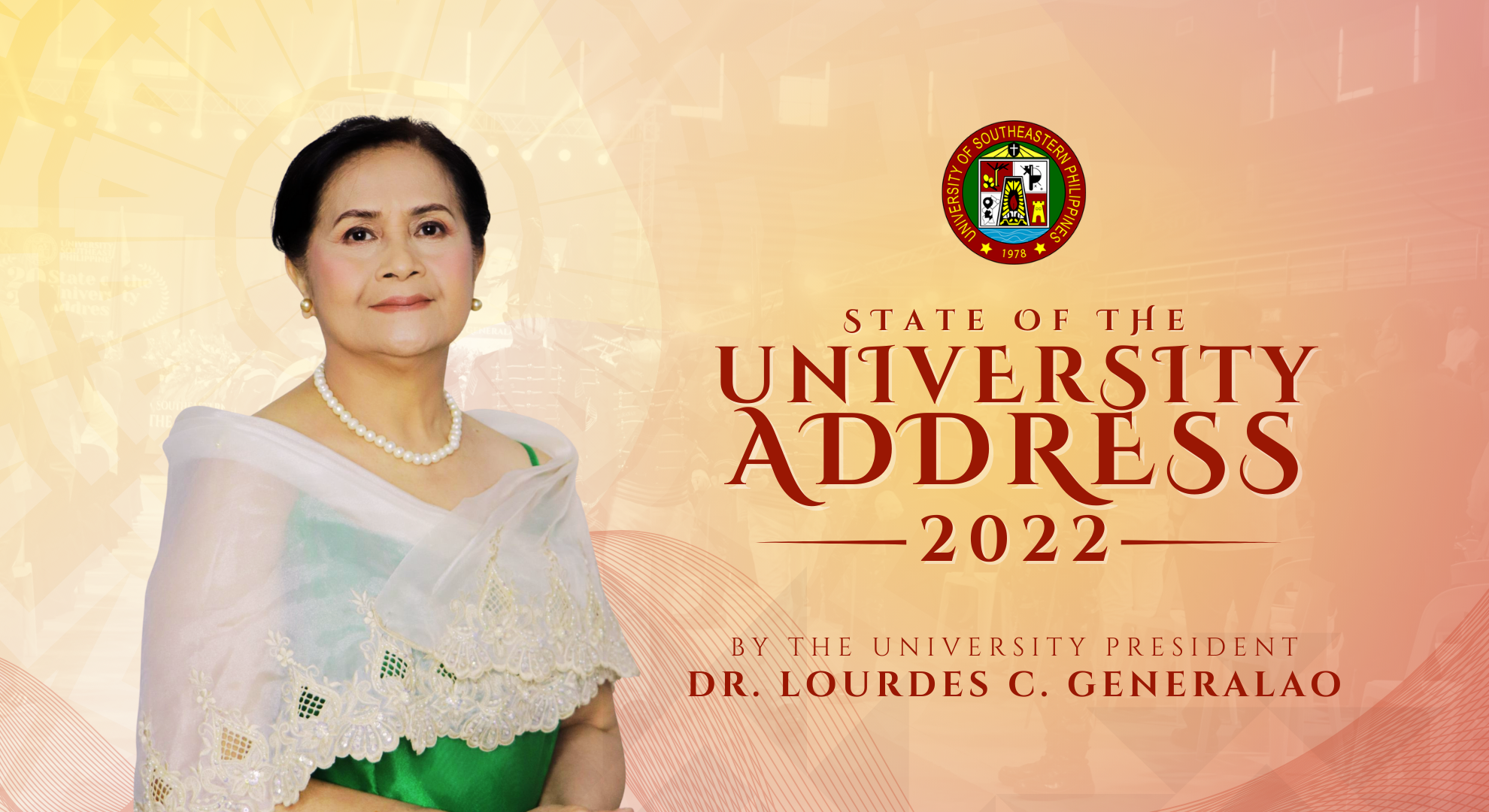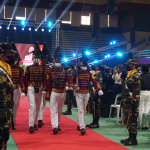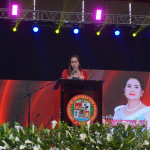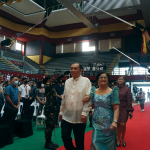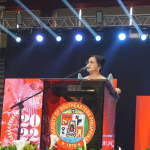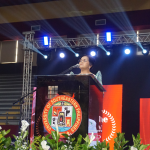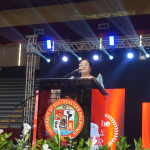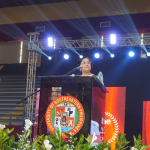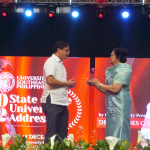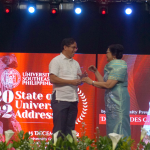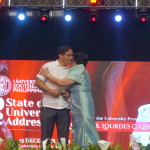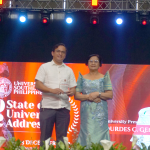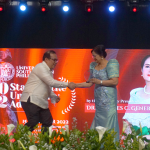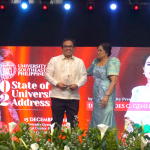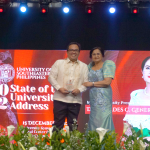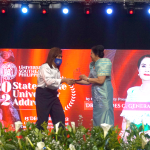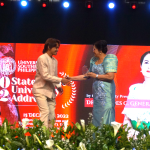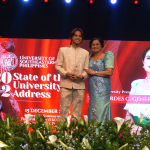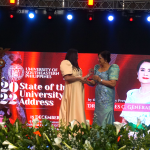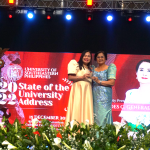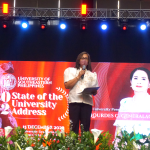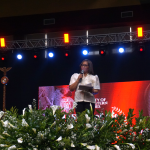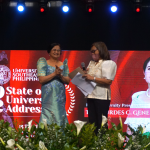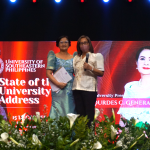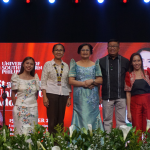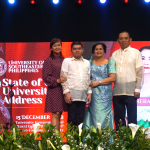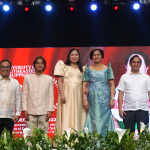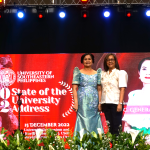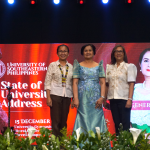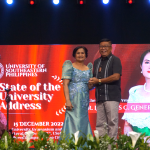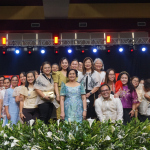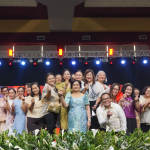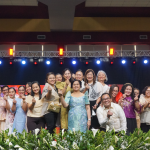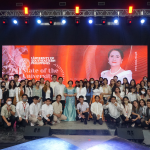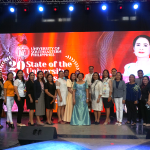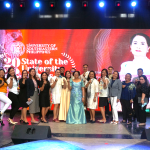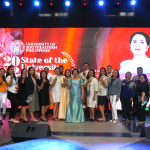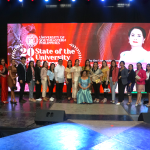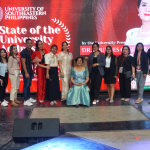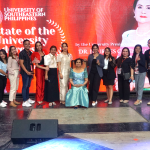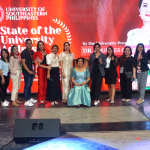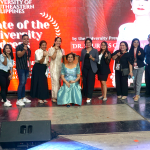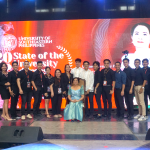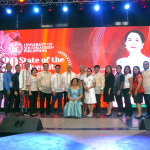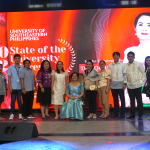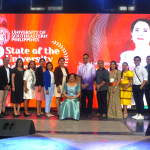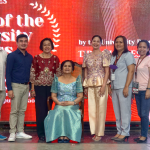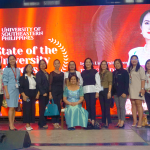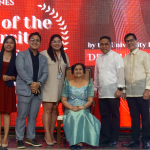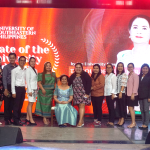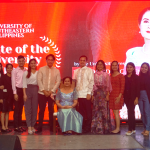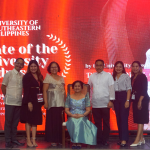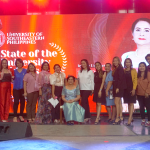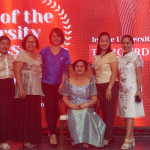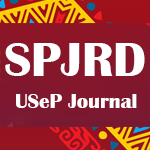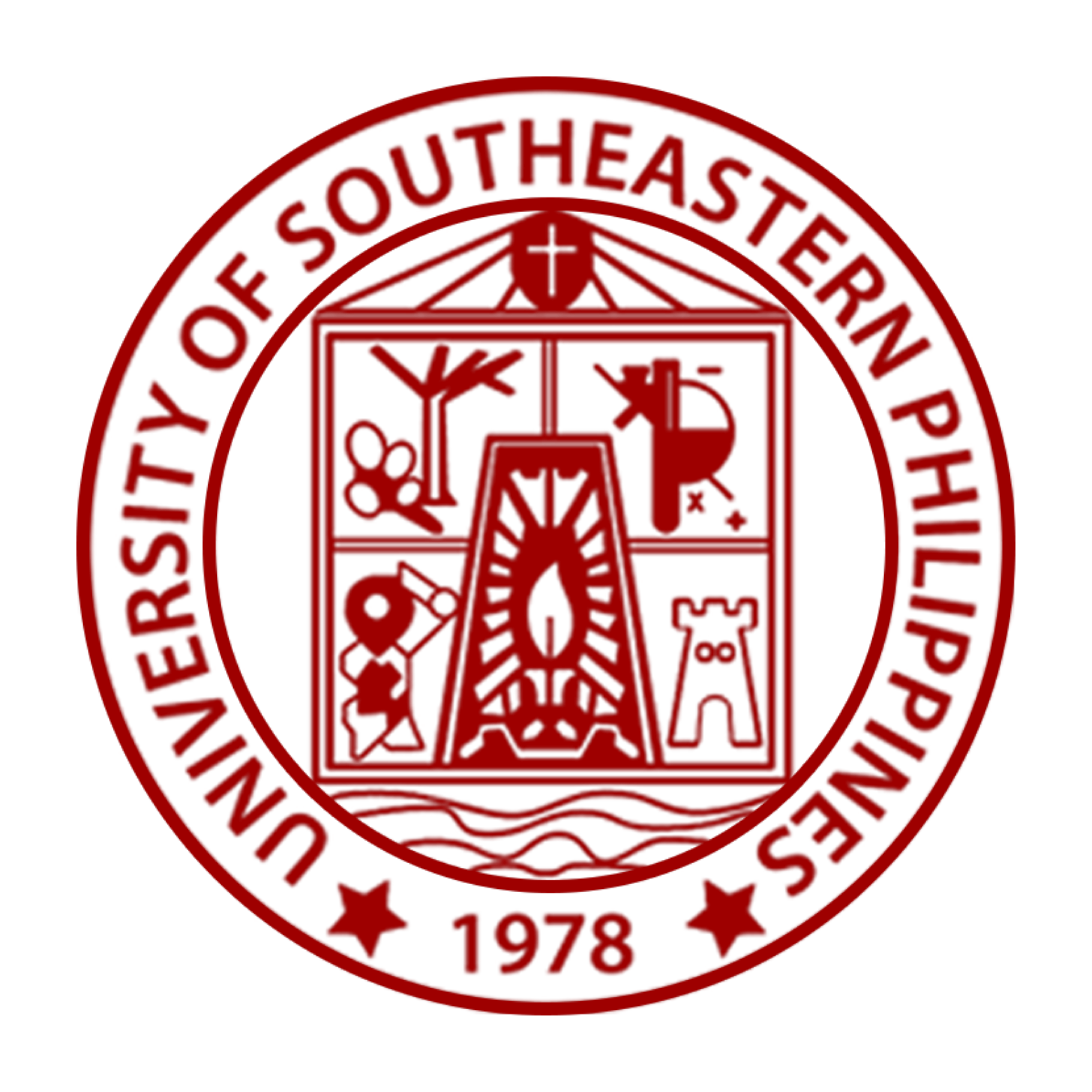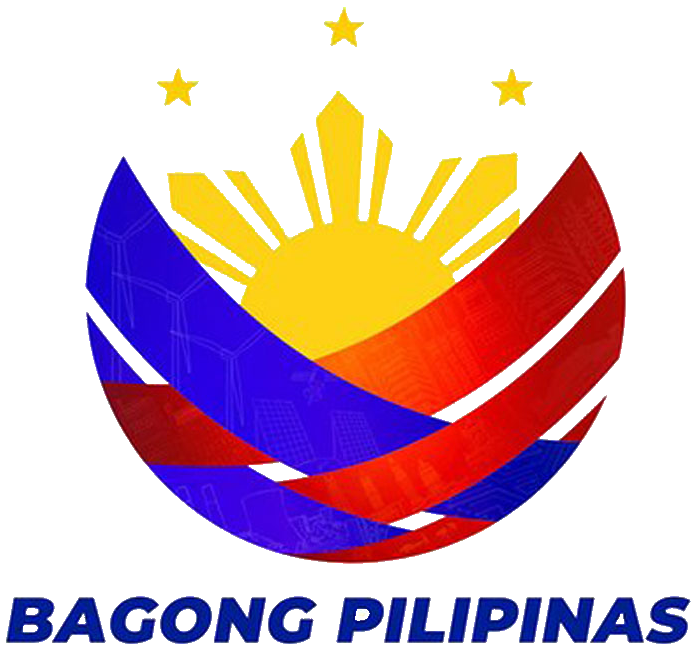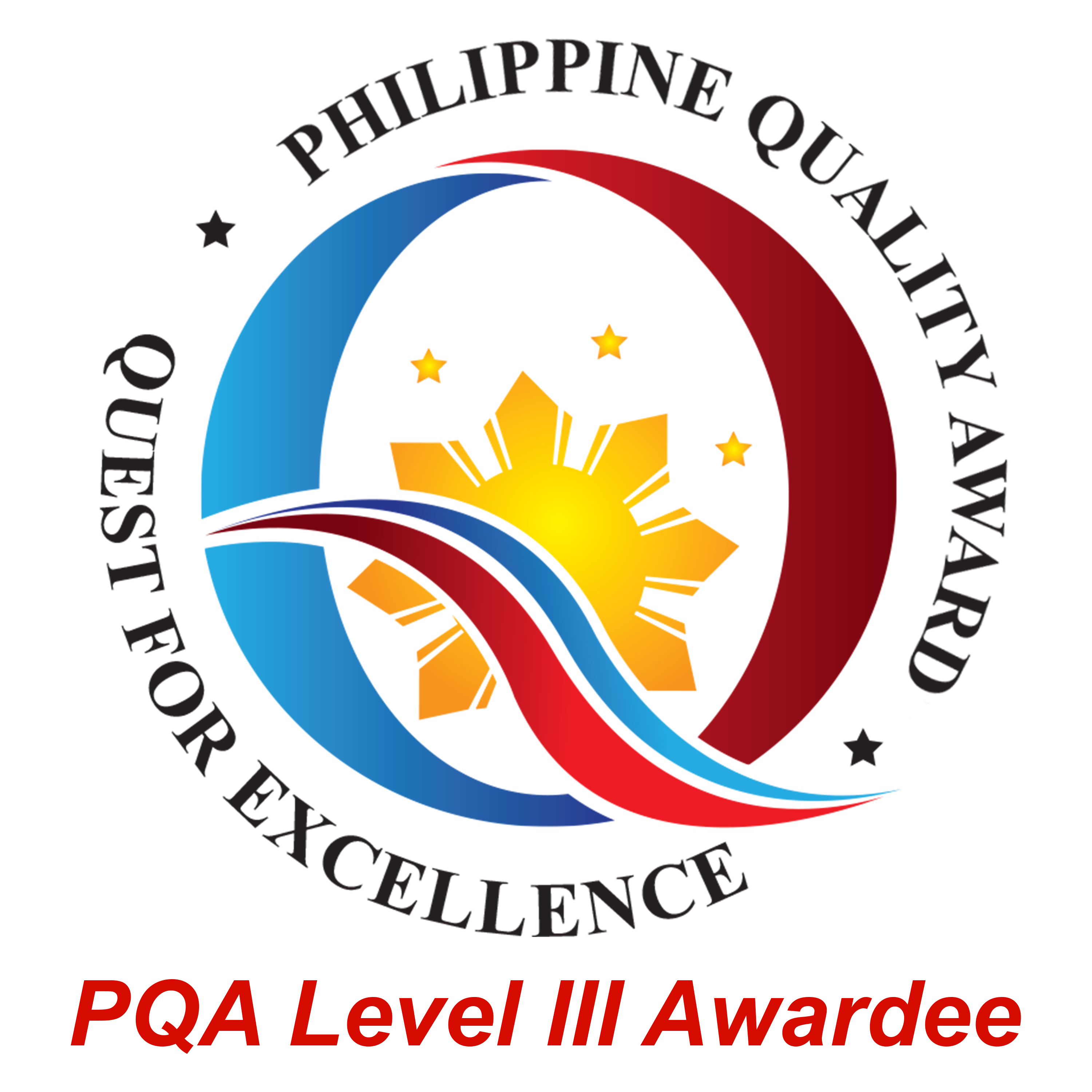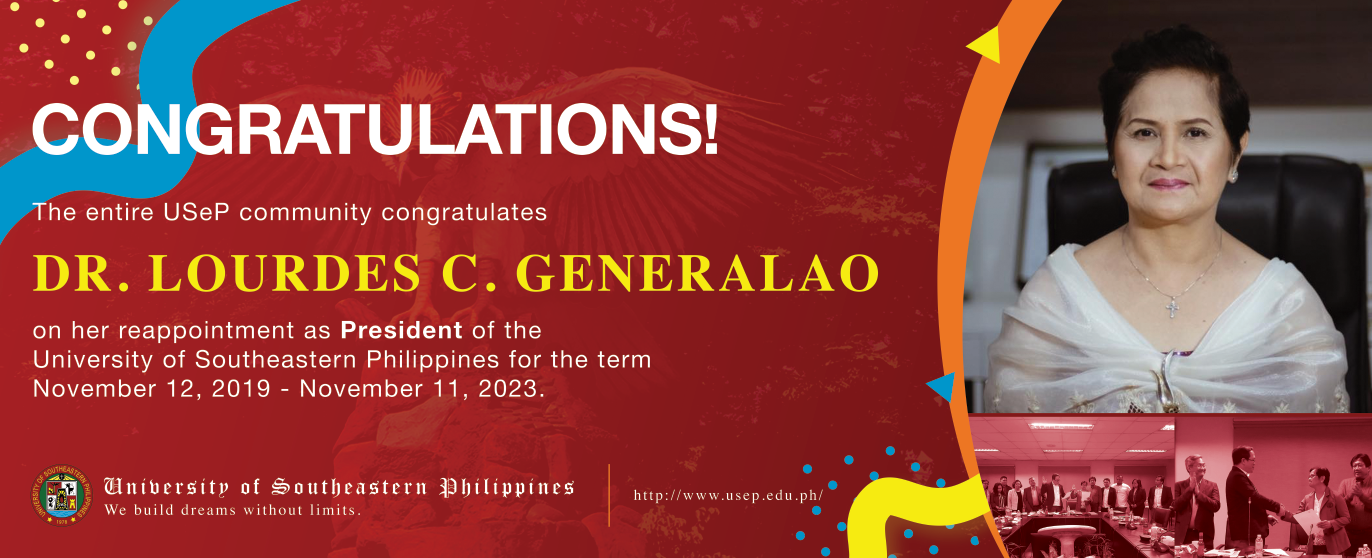Greetings to:
- To the Honorable Chair and Members of the University Board of Regents
- Members of the Administrative, Academic, and University Research and Development, Extension, and Innovation Councils
- Faculty Members and Non-Teaching Staff
- Student leaders
- Students and Alumni
- Our partner agencies
- My beloved husband, Dr. Irvin, and my kids, Atty. Iresha, Irvin Jr. and his wife Jerle, and Andrei
- Ladies and gentlemen
Maayong buntag kanatong tanan!
To say that 2020 was challenging is an understatement. The rise of the COVID-19 Pandemic had sent the world down to its knees with slim to no preparations, forcing various organizations to create spontaneous mechanisms to mitigate its adverse effect and embarked on measures such as mobility restrictions to counter the spread of the virus.
The University of Southeastern Philippines (USeP) was not spared. It has its fair share of obstacles. The sudden imposition of lockdown left the University in limbo and put the resilience, leadership, and creative collaboration of the USeP community to test. The past years have changed the higher education landscape but despite that, the University remained steadfast in embracing and responding to present changes.
In the wake of the pandemic, under the mandate of the national government, the University started to shift to distance learning, remote events, and hybrid work. Zoom meetings became the norm. As the situation has slowly returned normal and the economy reopened, in-person activities are making a comeback.
Now, more than two years of battling an unseen enemy, and after a long time of being limited to conducting our events virtually, we are now finally able to celebrate the 44th Founding Anniversary of our beloved University face-to-face. Despite all the uncertainties that we faced, we held on to the hope that the light of a brighter tomorrow will once again shine upon us. And it is that hope, along with our perseverance, resilience, and hard work, that brought us to where we are today.
I started my role as the University President in 2015, but long before that I already served as one of USeP’s faculty members for more than 35 productive years. During the length of my stay here in USeP, I can personally attest how things changed for the better. As time went by, USeP has strived to evolve along with the rising demands of the society, especially in terms of quality education. Even during the pandemic, where we were forced to transition our services and activities online, USeP continued to push forward, for the sake of its stakeholders and the community that it serves.
What we learned during this past year of operating amidst a global pandemic is best represented by the core values of the University with the acronym CARES that stands for Collaboration, Accountability, Resilience, Excellence, and Service Oriented. Truly, USeP CARES. The University’s nurturing character was highlighted in helping the community in times of crisis.
We learned to set aside our differences and work towards a common goal. We took responsibility in handling the challenges faced by the University and learned to adapt to changes in order to provide solutions to every problem. No matter the struggle, we retained our composure and went beyond our limitations to bring our plans into reality. Excellence flowed from the Administration, towards the faculty, staff, and of course, our students who, despite the pandemic, successfully passed and topped the Licensure Examinations. Amid these trials, the University gracefully recovered, and we remained a community that is passionate in and committed to public service.
Truly, just as the English Theologian, Thomas Fuller, once said:
“The night is darkest just before dawn.”
USeP has endured many storms and remains an indestructible fortress standing stronger with each battle it overcomes. Consistently, we have used our circumstances as steppingstones towards success. This is why I am confident that USeP will continue to thrive in the years to come, with the help of its constituents.
Admittedly, USeP presidency is never an easy and smooth-sailing journey. Along the way, especially at the height of the pandemic, my character as an individual and capabilities as a leader were challenged. And during those times, I am reminded of the phrase by Jame Fourde, an English historian, who said:
“You cannot dream yourself into a character; you must hammer and forge yourself into one.”
Ultimately, I also witnessed myself evolve as needed, for the entire USeP community is looking up to me to make plans and decisions with the best interest of the University and its stakeholders in mind. I held this role very seriously and passionately, and I am blessed to have been able to work with exceptional individuals who have greatly contributed to the progress and success of the plans that we have envisioned together.
I am proud to announce that most of these plans have been successfully executed, and the others are near completion. It is also worth mentioning that we exceeded in some of our targets.
This is not my feat alone– it is ours. And we owe this success to one another. With pride and joy, I present to you the progress of the University for 2022.
IN THE AREA OF GOVERNANCE
This year, we slowly transitioned back to our traditional way of operation, although not entirely. No matter how challenging this seemed, the University, through the support and commitment of the members of the USeP community managed to successfully realize programs, activities, and projects which I am proud to share with you.
Significant BOR Actions
As of November 2022, the Board of Regents has passed a total of 183 Resolutions.
Significant approvals made by the Board include the USeP Policy Guidelines on Hiring/Re-Hiring Contract of Service (COS) and Job Order (JO) Personnel, the Grant the Collective Negotiation Agreement (CNA) Incentive for FY 2022 to Qualified University Personnel, the Scrap and Build of Faculty Positions, the USeP Public Investment Program (PIP) 2023-2028, the Three-Year Rolling Infrastructure Program (TRIP) 2024-2026, the Thesis/Dissertation Advisory Committee (TDAC) Implementing Rules and Regulations, and the confirmation of the USeP Merit and Selection Plan (MSP).
Further, the USeP Board, during its special meeting held on October 18, has confirmed the promotion of 38 faculty pursuant to USeP Internal Guidelines for Faculty Promotion. In the same meeting, the BOR has approved the reclassification of 196 faculty pursuant to NBC No. 461 8th cycle which took effect on November 15.
The University is pursuing the approval of the Revised Organizational and Staffing Standards for SUCs (ROSSS) – Phase 1. This is conditionally approved by the Board during its November 25 meeting. The Notice of Organization Staff Compensation Action or NOSCA for the ROSSS has been released to some SUCs that is why I am positive that USeP will soon receive the NOSCA.
I want to express my gratitude and acknowledgment to the USeP Strategic PlanBoard of Regents for its sustained leadership in steering the University toward a strategic direction. I sincerely admire the Board’s wisdom in enabling the University to make sound decisions and in implementing important policies that benefit the University’s stakeholders and constituents. Under the guidance of the Board, the University aspires to have a higher, deeper, and wider transformative impact on society through continual innovation in education, research, creativity, and entrepreneurship.
USeP Strategic Plan 2022-2027 and the Institutional Development Plan
Following the successful conclusion of the Catch-Up Plan 2018-2021, we came up with another framework to keep our momentum and ensure that the programs and projects of the university are aligned to the current trends.
Last April 27, the USeP Board of Regents (BOR) has approved the USeP Strategic Plan 2022-2027 with its Three-Year Institutional Development Plan from 2022-2024, including the Vision, Mission, Goals, Educational Philosophy, Quality Policy Statement. In the several cascading activities about the USeP Strategic Plan to all campuses and to external stakeholders we have clarified our intention to transform communities in Mindanao, in the ASEAN, and beyond. This explains our vision statement which is a “Premier research university transforming communities in the ASEAN and beyond”.
10-year USeP Land Use and Infrastructure Development Plan (LUDIP)
Through the USeP Technical Working Group (TWG), we submitted the Land Use Development and Infrastructure Plan (LUDIP) 2022–2031 to the Commission on Higher Education through the Regional Office 11 for evaluation and endorsement of the LUDIP TWG 11 to the USeP Governing Board. The formulation of the plan was assisted by the Department of Human Settlements and Urban Development XI and reviewed by the TWG external members from CHED XI and NEDA XI.
6-Year Quality Assurance (QA) Plan
I also want to recognize the Quality Assurance Division (QAD) for preparing a six-year Quality Assurance (QA) Plan, aligned with the University Strategic Plan. The creation of the plan asserts our commitment in sustaining and improving our academic and administrative performance to make the university stand out from the herd and build a brand of excellence.
ISO 9001:2015
The culture of excellence is embedded in our system. As we journey towards our goals, we ensure the efficiency, productivity and customer satisfaction in our execution. With this, the University successfully passed the ISO 9001:2015 Surveillance Audit held virtually last May 30-31. We successfully maintained our ISO quality assurance plancertification after receiving no non-conformities during the 2-day audit conducted by SOCOTEC Certification Philippines, Inc.
At present, we have a total of 61 Procedure Manuals and 163 Controlled Forms. These QMS documents can be accessed at the University website, under the transparency seal.
Updates on Philippine Quality Award
Dr. Renny McLean said and I quote: “Mediocrity is the enemy of excellence.” Drawing inspiration from this adage and our commitment with regards to Quality Management System, we hired a consultant who will assist the University as we continue to pursue the Philippine Quality Award (PQA).
PQA is a national quality award for Total Quality Management in the Philippines which aims to recognize public and private organizations and other stakeholders who exemplified performance excellence.
Business Continuity Project for SUCs
I am pleased to report to you that the University has completed the Business Continuity and ICT Continuity Plans under the Business Continuity Project for SUCs Project of the CHED and De La Salle – College of St. Benilde. These plans will be incorporated into the Disaster Risk Management Manual of the University.
Program to Institutionalize Meritocracy and Excellence in Human Resource Management (PRIME-HRM) Awardee
Having obtained the Maturity Level II in Four (4) Human Resource Systems, viz: Recruitment, Selection, and Placement; Learning and Development; Performance Management; and Rewards and Recognition, the University was among the Civil Service Commission (CSC) Program to Institutionalize Meritocracy and Excellence in Human Resource Management (PRIME-HRM) Awardees for the 2022 Regional Recognition and Awards
The University was also recommended by the CSC for PRIME HRM Bronze Award Maturity Level II in all the HR systems. The virtual assessment happened on September 19-21, 2022.
Strong Gender and Development (GAD) Programs
Higher Education Institutions (HEIs) play a crucial role in mainstreaming gender equality in society. Understanding this responsibility, we have championed gender roles and rights for men and women in the university through developing gender-responsive programs to address issues surrounding the Gender and Development (GAD).
I want to share with everyone that in the recent Gender Mainstream Evaluation Framework Report, USeP achieved Level 3 GAD Application which means that GAD-related activities are already institutionalized within the organization. Interventions are usually based on a strategic GAD agenda that guides GAD planning and budgeting implementation. The GAD planning and budgeting, which we have been doing, have become more strategic in terms of applying gender analysis in regular programs that result in either increased attribution of the GAD budget and/or more gender responsive programs.
As part of our GAD programs, we celebrated the Women’s Month last March, and held several activities in support of the18-day campaign to end Violence Against Women. We continue to do Capacity Development on Integrating GAD Concepts and Identifying Gender Issues in Preparing PAPs Using Harmonized Gender and Development Guidelines (HGDG) Tool.
My earnest thanks and commendation to the Gender and Development Office of the University led by Assoc. Prof. Rioliza Molina.
Outstanding Volunteer Award
Service to the community has always been at the heart of the university and being recognized for something that we love doing is a bonus.
The commitment of the USeP COVID-19 Task Force has earned the recognition of the Philippine National Volunteer Service Coordinating Agency, the Regional Development Council, and the National Economic Development Authority XI. The Task Force was awarded Outstanding COVID-19 Volunteer Award in recognition of its invaluable service in the country’s response to the pandemic.
This award further inspired us to make a difference in our own unique way and contribute to nation building.
Budget Allocation
I would like to express my gratitude to the national government for its continuous support to the University through financial subsidy.
This year, the University, per the approved General Appropriations Act (GAA) for 2022, has a budget of 778,539,000 pesos that includes the 10-million-peso budget for the infra and smart campus development and operationalization of face-to-face classes and the 70-million-peso budget for the support of the School of Medicine.
Rise of Infrastructures and Significant Procurements
Gone are the days where students have to endure dilapidated and outdated school facilities. With our direction aimed towards globalization, we allocated a huge chunk of the budget for the construction of state-of-the-art buildings at par with the international standards, thanks to the generosity of our national government.
I once had a colleague who, after several years, had just visited again the Obrero Campus and she told me that when she entered the main gate, she was amazed on the new buildings. She said “abi nako ug nasaag ko”. This physical development is not just true in the Obrero campus.
If you will visit the campuses of the University, you can see the rise of several infrastructure projects. We owe this to the past and present administration who lobbied for the funding for the construction of the several buildings across campuses.
For 2022, an amount of 287 million pesos was spent for the construction and repair of buildings across campuses.
This year, 14 projects were completed, while 14 are currently constructed or being repaired.
Among the completed projects are the:
- Construction of 7-Storey Multi-Media Learning Resource Center Phases 2 and 3;
- Improvement of Classroom and Electrical Connection for School of Medicine Building;
- Construction of Administrative Building Phase II; and
- Rehabilitation of Electrical System at the Mabini Unit.
Among the ongoing projects are the:
- Construction of 5-storey College of Engineering Laboratory Building- Phase II;
- Completion of School of Applied Economics Building Phases 1 and 1B;
- Construction of Technology and Business Incubator;
- Construction of Academic Building at the Tagum Unit; and
- Construction of School of Medicine Building Phases 1 and 2 at the Tagum Unit
I am excited to witness the completion of all these buildings. Seeing the ongoing construction and some buildings which have been completed like the newly-inaugurated Information Technology Building and those near completion like the 7-storey library building, I have said to myself that it’s all worth it – it’s all worth the effort – attending the budget hearing and waiting for your turn to defend the USeP budget until the wee hours. This is the fruit of our labor, and to the divisions and offices that did the completed staff work – the IPD, the PDD, and counterparts in the external campuses, my earnest thanks to all of you.
Aside from infra projects, we had a lot of significant procurements this year. Among those are the:
- Installation, Systems Acquisition, and Activation of Turnstile Access System at USeP Mintal, Campus, Davao City amounting 3 million pesos;
- Supply and Delivery of Laptop Computers for USeP Resource Management Division (RMD) amounting 11.2 million pesos which are designed to be rented by the University students;
- Procurement of Electronic Resources for USeP-ULRC amounting 2 million pesos;
- Procurement of Laboratory Supplies and Equipment for USeP-College of Engineering amounting to 2.1 million pesos;
- Various procurements for the Technical, Scientific, and Medical Journal and Equipment for School of Medicine with a total amount of 63.9 million pesos;
- Strengthening the Instructional Facilities of the BS-Agricultural and Biosystems Engineering Program of USeP Tagum Unit (Rounds 2 and 3) with total amount of 8.7 million pesos;
- Procurement of Various Laboratory Equipment for CARS amounting to 1.9 million pesos; and
- Books for ULRC Mintal Campus with a total cost of 1.3 million pesos.
I want to thank the respective Bids and Awards Committee, its Secretariat, and the Technical Working Group across campuses for helping the Management achieve a sound and transparent procurement process.
On Personnel Development
As of November 10, the University has recorded a total of 1,148 employees, with 561 regular and part-time faculty members and 587 non-teaching staff including those hired for the RDE projects funded by external agencies.
This year, 23 faculty members are on study leave. Three (3) of them are pursuing doctorate degree abroad at the Kangwon National University in Korea, Hong Kong University of Science and Technology, and Hiroshima University. Also this year, three (3) faculty members who applied for study leave in previous years have finished their respective doctorate degrees and as a family we rejoice with them especially with the distinct recognition received by one them, Dr. Roperto De Luna, Jr., who graduated summa cum laude at the University of Sto. Tomas with Doctor of Philosophy in Economics degree.
As of November 2022, the University, through the HRMD, has conducted 12 inhouse trainings with a total of 586 trainees or participants.
INTERNAL TRAININGS
- Webinar Using CDIO to Address Challenges of Education 4.0 in the Era of Industry Revolution 4.0;
- Workshop on Synchronization of Courses in the Graduate School;
- Holistic Onboarding of New Employees (HONE) Phase 1: The First Flight;
- Course Pack Development for New and Part-time Faculty;
- JO/COS Policy Orientation;
- Training – Workshop on Overload and Service Credit Computation;
- Training on Basic Data Management using Microsoft Excel;
- Weekly Life Empowerment;
- Disaster Risk Reduction and Management Training;
- Basic Customer Service Skills; and
- Integrity, Transparency and Accountability in Public Service.
Aside from the HRMD, other offices in the University have also made several in-house trainings and webinars for the human resource of USeP like those that relate to gender and development, data privacy, and quality management system, among others. Some personnel of the University were also sent to trainings organized by reputable organizations. For 2022, the University has spent 4.1 million pesos for faculty and staff development.
Management Information Systems
In the digital era where massive disruptions are happening, the mantra is: Adapt or perish. The University, being adaptive to a fast-changing environment, has initiated measures to take advantage of new technologies to make its operations more effective and efficient.
The University, through the Systems and Data Management Division under the supervision of the Vice President for Planning Quality Assurance, has developed various systems which are essential to the continuity of business and operations in the University.
- We upgraded the Google License to Teaching and Learning Edition and renewed Microsoft Office 365 license for faculty and released the same license for students via student portal to ensure that necessary license supports the requirements of the University and conforms to government policy requirements.
- Last October, we also released ICT devices to external campuses for Improvement of Campus and Intercampus Connectivity
- The development and deployment of the online University Gazette, accessible through the USeP website, is very significant. This is a new and easy way to manage online publication of the Office of the President that contains policies and matters acted upon by the Board of Regents, Administrative Issuances, State of the University Address (SOUA) speeches of the University President, and the University Annual Reports. As of November 21, the University Management, through the Office of the Secretary of the University – University Records’ Office, had circularized or disseminated 131 BOR Resolutions, 231 Memoranda, 7 Memo Circular, 748 Special Orders, 471 Notice of Engagements. These can be found in the University Gazette.
- The SDMD has also developed and deployed the University Document Tracking System – and online system that can track the status of a document in route. A new updated version of DTS is now ready for release.
- The undergraduate and graduate programs and ETEEAP applicants can also utilize the enhanced Online Admission system for Academic Year 2022-2023.
- The development of e-Performance Monitoring System Development (ePMS) is also strategic as it aims to manage all phases of the Strategic Performance Management System such as Performance Planning, Coaching and Mentoring, Performance Review and Feedback, and Performance Rewarding and Development Planning.
- We also have an Online Virtual Testing which transforms the psychological tests facilitated by the University Assessment and Guidance Center into a virtual platform. It is designed to ensure data security, given that the tests are standardized.
- There is also the development of University Resources Management System (URMS) – an information system aimed to efficiently manage ICT and non-ICT devices and equipment of the University.
- And of course, we continue to enhance the existing online systems including HRIS, UDAS, and Student Portal, among others.
Partnerships
The health crisis did not dampen the spirit of the University to expand its network with other higher education institutions here and abroad in a bid to forge collaborations on instruction, research, and student and faculty externship programs. The accumulated efforts of the officials, faculty and staff of the University have led to several partnerships. These linkages are essential to reinforce the University’s internationalization efforts.
This year, the University has forged a total of 52 Memorandums of Understanding and Memorandums of Agreement with various institutions here and abroad.
To date, we have 14 active international partners such as the:
- Chandigarh University, India;
- Mindanao Japan Science and Technology Platform;
- Universitas Negeri Yogyakarta, Indonesia;
- Tan Trao University, Vietnam;
- Tra Vinh University, Vietnam;
- King Mongkut’s Institute of Technology Ladkrabang , Thailand;
- Sakhon Nakhon Rajabhat University, Thailand;
- Suan Dusit University, Thailand
- Southern Taiwan University of Science and Technology;
- Institut Polytechnique Des Sciences Avancees, France;
- Asia Technological University Network (ATU-Net);
- University Mobility in Asia and the Pacific (UMAP);
- Philippines Association of Friendship Education and Promotion (AFEP); and
- ACT-IHE for British Council
Internationalization Updates
This year, we organized and participated in key international conferences and trainings to guarantee that USeP will remain responsive to the growing trends in education.
We joined the Project Forth European Visit funded by the European Commission. The face-to-face gathering allowed the project constituents to discuss framing the curriculum for Teaching in Challenged Areas, particularly that USeP is determined to integrate the competencies in the Masters in Education programs.
Also, our VP for Academic Affairs, Dr. Bonifacio Gabales, Jr., was invited as resource speaker at the Global Education Summit 2022 conducted by Chandigarh University India last October. He discussed how USeP thrives in using innovation to improve the quality of life of its stakeholders and of the external community.
The University in partnership with the Commission on Higher Education and the British Council, conducted a Grand Launching of the Access and Competitiveness through Internationalization of Higher Education (ACT IHE) Project Cascade Training on English Medium Education at USeP Tagum Unit last June 30.
This year, the University organized four international conferences, namely: the Webinar series on the Global Emerging Trends in Higher Education: Inter-contextualized Discourses for Competency Development last May 25-27 by the College of Education and College of Teacher Education and Technology; the First Research Conference on Business and Interdisciplinary Studies (RCBIS) last June 30 organized by the College of Business Administration; the International Conference on Bangsamoro Literature (ICBL) last September 29-30 organized by the Mindanao Center for Policy Studies; and the International Conference on Arts and Sciences (ICAS) by the College of Arts and Sciences last November 17-18.
Also, 22 students from the College of Business Administration (CBA) were sent to Chandigarh University (CU) last September 20 for the Semester Abroad Program (SAP) with the eligibility of credit transfer. They are expected to complete a three-month academic exposure and trainings relative to their program.
Professors from Chonnam National University, South Korea visited the USeP Tagum Unit last August 16 to exchange ideas with the faculty-researchers on agriculture.
Freedom of Information Updates
Transparency is a fundamental element in building trust and accountability, key recipes for good governance. As the President of this university, I see to it the public has access to information.
As of October 30, the University has received and processed 572 FOI requests. Five hundred thirty-one (531) of these were successfully provided; and the rest were either denied, referred to another government agency, pending awaiting clarification, and closed. It can be recalled that USeP won as the 2021 FOI Champion in the SUCs Category and our FOI Decision Maker, our University Records Officer (URO), Mr. Robert Satorre, was also awarded as Best FOI Officer. Mr. Satorre was chosen to be a resource person during the 2022 Freedom of Information Summit last November 24.
Performance-Based Bonus
This year, the University was declared eligible for FY 2020 Performance-based Bonus but with isolation. We already received the said bonus. As regards FY 2021 PBB, we have already submitted the required reports on the agency’s performance targets to the AO25 Secretariat last February. The AO25 is yet to release the result for the list of SUCs that qualified for PBB 2021.
Benchmarking Activities
The University also hosted twenty (20) different benchmarking activities. The Central Bicol State University of Agriculture visited theUSeP Mintal Campus- Pamulaan Center for Indigenous People’s Education to learn the University’s best practices, and understand the process of managing a center for IPs. Other SUCs that visited the University are Bohol Island State University (BISU), Cotabato Foundation College of Science and Technology (CFCST), and Eastern Samar State University (ESSU), Caraga State University, and MSU IIT and MSU Maguindanao.
SIGNIFICANT ACTIVITIES
Several significant events were held this year.
2022 Government Service Awarding Ceremony
As the country marks the 122nd Anniversary of the Philippine Civil Service, the University physically held the annual Government Service Awarding Ceremony last September 16 which seeks to recognize the invaluable service of the USeP employees.
Forum on Davao Region SUCs Budget Allocation
The University hosted a Forum on Davao Region SUCs Budget Allocation last February 22. The DBM – ROXI shared the evaluation criteria that it is using for Tier 2 proposals. It was resolved during the Forum that the Davao Region SUCs will seek the help of the Regional Development Council – XI and key leaders in the Region in lobbying for an increase in the budget allocation of the SUCs, especially for the Congress Introduced Changes and Amendments. True indeed, the RDC XI favorably acted upon the resolution of PASUC XI.
Weekly Life Empowerment
The Human Resource Management Division (HRMD) spearheaded the conduct of a Weekly Life Empowerment for all Administrative Council (AdCo) Members every Friday, which began last May and will end this month (December).
The Weekly Life Empowerment aimed to empower, train, and equip people to become agents of change in their respective positions through discovering themselves, developing skills, and deploying potential to dominate in their areas of influence.
Top Management Meetings
To discuss and act on pertinent matters involving the University, especially those that are urgent and within the authority of the President, the Office of the President has organized at least 16 Top Management Meetings in 2022. The Top Management meetings are regularly done prior to the AdCo, UAC, and URDEIC meetings to ensure that matters to be deliberated by the Councils have been threshed out at the level of the Top Management.
Equally significant activities that we were able to push through as planned include the:
- Family Day celebration across campuses
- Town Hall meetings
- Cascading of FY 2022 OPCR/CPC/IPCR Targets;
- Budget Review and Consultation for FY 2023;
- USeP Faculty and Staff Induction Program;
- Policy Orientation for Contract of Service (CoS) and Job Order (JO) personnel; and
- Capacity Development on Management of Virtual and Hybrid Events
IN THE AREA OF INSTRUCTION
The University has recorded a total of 9,524 enrollees from January to May 2022 and 10,865 enrollees from August to December 2022. These include the 62 IP-students enrolled under the Pamulaan Center for Indigenous Peoples Education.
For second semester of school year 2021-2022 and off-semester of 2022, the University President has conferred 1,341 graduates from higher education and 112 from advanced education.
Certificate of Program Compliance (COPC)
As part of our effort to strengthen the higher and advanced education programs of the University, may I share with you that as of November this year, 69.77% or 30 of 43 undergraduate programs
and 10.71% or 3 of 28 graduate programs have Certificate of Program Compliance. This is a continued wor k in progress.
Program Accreditation
To guarantee the quality of higher education we serve our stakeholders, the University subjected 33 academic programs to accreditation by the Accrediting Agency of Chartered Colleges and Universities in the Philippines (AACCUP) from March to November of this year.
As of November 2022, the undergraduate programs of the University have six programs with Level I accreditation; nine with Level II accreditation; 16 with Level III accreditation; and one with Level IV accreditation. As for the graduate programs, there are 11 programs with Level I accreditation, 17 with Level II accreditation, and one with Level IV accreditation.
The University’s annual accreditation target for undergraduate programs is 97% percent and USeP achieved 100% percent or 31 out of 31 accreditable programs were accredited. For graduate programs, the target is 86% and the University has achieved 93% percent as of the third quarter this year.
School of Medicine
When I ran for the Presidency, one of my plans was to establish a School of Medicine to help underprivileged individuals pursue medical education and training. Unknown to many, when I was a child, I dreamed of becoming a medical doctor but due to financial constraints, I had to let go of that dream. I guess God’s plan is only to use me to provide that opportunity to other people instead of becoming one.
This year marks the second year of operation of the Doctor of Medicine program. We have 19 second year and 55 first year students. I am truly glad to see that we have the strong support from the government demonstrated by the ongoing construction of the
School of Medicine building, the procurement of technical, scientific and medical journal and equipme nt and the support for the MOOE for the School of Medicine. Our partnership with the Commission on Higher Education has given deserving underprivileged students an opportunity to pursue medical education through the Medical Scholarship and Return Service (MSRS) Program which gives each scholar or grantee P88,500.00 per semester.
School of Law
Injustice is prevalent among the marginalized population who cannot afford to hire their own lawyers. Aiming to address this widening gap in the justice system, we hurdled the tedious process of establishing a Law program to provide accessible legal education to students who are passionate about helping its fellow countrymen attain justice.
We are now on the fourth year of operation of the School of Law. We have a total of 110 Juris Doctor program students; 21 of them are now on their fourth year and 45 are on their first year. I am thrilled to confer the JD degree to our first batch of graduates next year.
Looking back, both the Doctor of Medicine and Juris Doctor programs were only accessible to those who can afford them, and offering these programs in USeP was once but a dream. Now, looking at the status of SoM and SoL, I can’t help getting emotional knowing that the promises I made when I ran for presidency are now fulfilled.
As I see it, people who came from an underprivileged community are the real dreamers who wanted to overcome all barriers to change the generation of their respective families. I feel satisfied whenever I hear about the transformed lives of these people. This is school of lawcollalso the reason why the College Education Behind Bars is close to my heart.
College Education Behind Bars
Education is not a privilege. It is a human right. Everyone deserves to earn a degree regardless of one’s background without any discrimination. As a champion of accessible education, the successful operation of the College Education Behind Bars at the Davao City Jail is a manifestation of our commitment to transform lives.
At present, we have 81 enrolled students under the College Education Behind Bars at the Davao City Jail. This is a very noble program of the University in partnership with Social Entrepreneurship Technology and Business Institute (SETBI) and the Bureau of Jail Management and Penology. Per record, seven (7) have graduated through the Program, three (3) of them are gainfully employed with multinationals, two (2) have their own businesses, and two (2) are employed by a prestigious law office and plan to continue their law studies. I learned that they have already passed the USeP School of Law entrance exam. The CEBB program has been duplicated in Davao Prison and Penal Farm with a bigger campus in partnership among SETBI, BJMP, and Davao del Norte State College. The program has been recognized nationally and has been adopted as a national program to be implemented nationwide in all BJMP jails by the DILG. The SETBI, BJMP, USeP model at the Davao City Jail will serve as model nationwide. Internationally, the program has served as a model for lifelong learning by the UNESCO UIL and has been showcased as a model to reform the criminal justice system presented by the Philippine Center for Investigative Journalism, in partnership with the American Bar Association-Rule of Law Initiative during the PCIJ Prison Reform Forum.
Like the CEBB program, a new undertaking of the University which I will forever be grateful because it started under my term is the establishment of the USeP Malabog Extension Campus
USeP Malabog Extension Campus (USeP-MEC)
I grew up in a rural area where tertiary education seems far-fetched for most people due to the distance of the schools. One has to travel to another province just to earn a degree. The lack of accessible higher education institutions is one of the primary reasons why some preferred to join the workforce right away.
The establishment of USeP-Malabog Extension Campus is close to my heart as it will provide an opportunity to the community especially the indigenous peoples (IPs) to study in a university without having to travel for miles.
Last January 7, we signed a MOA with Brgy. Malabog for the Operationalization of the USeP-Malabog Extension Campus. We also signed a separate MoA with the National Commission on Indigenous Peoples (NCIP) and ATA Indigenous Cultural Communities (ICCs) for the establishment of USeP-Malabog Extension Campus within the Ancestral Domain of the ICCs. Of course, the University inked a MOA with the City Government of Davao for the financial and other resources needed for the USeP MEC.
Finally, last June 22, the USeP family became bigger when we officially launched the USeP – Malabog Extension Campus with Bachelor of Science in Agribusiness and Bachelor of Science in Entrepreneurship as initial academic programs. The Paquibato National High School (PNHS) in Brgy. Paquibato Proper, Paquibato District served as the temporary school site of the USeP MEC. We had a MOA with DepEd XI for the temporary school site.
The USeP CDIO Journey
The University has been actively taking part in regional meetings and CDIO or Conceive-Design-Implement and Operate trainings organized by PASUC and Singapore Polytechnic.
Faculty from the College of Engineering, College of Technology, and College of Information and Computing were sent to trainings since 2014.
In 2020, the Office of the University President appointed a focal person and formed a Committee that will spearhead the CDIO program of the University with the goal to address the quality of education and specifically satisfy the demands of industry in terms of skills, communication, and values.
To help attain this goal, USeP partnered with University of Science and Technology of Southern Philippines – Center for Innovative Teaching and Learning. Various coordination meetings, seminar-workshops and mentoring/retooling of faculty within the context of CDIO were conducted. Also, the syllabi were enhanced particularly the Teaching Learning Activities including the conduct of classes.
Smart Systems Laboratory
With the CDIO framework, the University can redesign engineering education to match the needs of the industry. With the creation of the Smart Systems Laboratory, CDIO’s role in experiential learning will be strengthened while also producing cutting-edge research results that will contribute to regional sustainability.
The University will be able to establish a well-equipped laboratory through these initiatives with assistance from the Department of Science and Technology (DOST) through the Philippine Council for Industry, Energy and Emerging Technology Research and Development (PCIEERD). This will support the innovative studies and scholarly works of its researchers. The creation of the laboratory will not only support faculty research projects focusing on the University’s and the DOST’s respective priority areas, but it will also give students and other stakeholders the chance to explore interdisciplinary topics outside the bounds of conventional approaches.
Our dear USePians have shown excellence during the licensure exams and various competitions organized this year as a result of the dedication of the Administration and the teaching staff to provide a better and enhanced academic year.
Consistent Graduates’ Performance in Licensure Examinations
USeP is indeed a powerhouse of Topnotchers. It’s competitive graduates consistently bring pride and honor to the University. For 2022, we are proud to say that the University has produced 15 placers in different licensure examinations, namely:
- Top 1 in Geodetic Engineer Licensure Examination
- Top 1, 5 and 6 in LET Secondary Level
- Top 3,4,7, and 8 in Geologist Licensure Exam
- Top 4 and 9 in Agricultural and Biosystems Engineer Licensure Examination
- Top 6, 8 and 10 in LET Elementary Level
- Top 6 and 8 in Registered Master Electrician Licensure Examination
It is also worth mentioning that USeP is hailed as
- Top 3 in the August and September Mining Engineer Licensure Examination with an 85.11 percent passing rate.
It is also noteworthy that our strong support to our students have led to awards in national, Mindanao, and regional competitions like the Information Technology Research Congress, the Mindanao Association of State Tertiary Schools Friendship Games, the 6th Test of Practical Competency in ICT Philippines 2022 Davao Region, 1st ASEAN Cuisine and Flavors Festival, and 2nd Philippine Open and 9th GenSan Summer YOUTH Fest (GSYF).
Alumni Accomplishments
Since its creation, USeP has always been aiming to provide quality education. This year, the following alumni have made names in the society proving that USeP certainly molds world class graduates:
- Atty. Rogelio G. Largo, former member of the USeP Board of Regents, former Acting Dean of the School of Law (SoL), and an alumnus of USeP, was appointed as Court of Appeals (CA) Associate Justice. Atty. Largo is a graduate of BS Statistics in 1994;
- Judge Jimmy Bustillo Boco, a USeP alumnus, was appointed as the new Regional Trial Court (RTC) Judge of Branch 2- Family Court (FC) of Tagum City. He is a graduate of Bachelor of Science in Agricultural Education major in Animal Science at USeP Tagum-Mabini Campus.
Judge Boco works at the RTC Branch 30 of Tagum City prior to his appointment last 9 March 2021; and
- Police Lieutenant General Vicente Dupa Danao, Jr. was designated as the Officer-in-Charge of the Philippine National Police (PNP) by former President Rodrigo R. Duterte, from May 8, 2022 until August 1, 2022. PLTGen. Danao, Jr. is a graduate of Master of Public Administration in 2006.
I am also pleased to share with you that as of November 30, the USeP Balay Alumni is 20% completed. It can be recalled that in October 2018, the Board of Regents approved the construction of Balay Alumni in Tagum Unit on a lot area of 1,000 square meters. The Balay Alumni Groundbreaking was held on April 20, 2019.
Conduct of Face-to-Face Classes and Activities
With the lifting of the restrictions, the University started to transition back to conducting limited face-to-face classes and activities across all campuses which include lectures, laboratory exercises, nursery area preparation, field activities, orientations, trainings, thesis defense, research and thesis activities, and sports tryouts, among others.
Several trainings were also received by the teaching staff across campuses. These include trainings on syllabus revision, instructional materials development on general education course, retooling of faculty on test construction; training and orientation on CDIO framework, flexible learning, strategic and futures thinking, leadership, curriculum development, gender and development, on internationalization of programs, assuring program quality, and on scholarship programs. Equally significant academic activities include field visits and benchmarking, mentoring and coaching, orientation on handling children with special needs, and activities on mental wellness and work life balance.
We are also very happy that this year, we’re able to physically hold the 43rd Commencement Exercises in the campuses of USeP last June and July. I must admit that it was a bit emotional both for the University and the graduates with their loved ones as the last face to face graduation ceremonies which we had were held in 2019, before the pandemic.
RESEARCH AND DEVELOPMENT, AND COMMUNITY SERVICE
The University is dedicated in transforming lives of individuals through training and education. In our quest to make communities in Mindanao worth living in, we constantly engage in several RDE programs, activities, and projects. Of course, all of these were fulfilled with the help of the different funding institutions.
For 2022, we have 22 completed research; 36 ongoing research projects/studies; and a total of 31 externally funded R and D projects that have an equivalent amount of 123 million pesos.
In the area of research, we were able to ink partnerships with 8 agencies and 4 industries and institutions. Among our research
outputs, 2 are being utilized by the industry. Also, we have a total of 8 research published in refereed journals and we have recorded a total of 35 citations. Fifty-two percent (52%) of our regular faculty members across campuses are involved in research. We are hoping that in the years to come this figure will significantly increase. I want to commend the College of Agriculture and Related Sciences for having the most number of research programs, projects and studies, both internally and externally funded. I also want to congratulate the College of Applied Economics because 100% of its faculty are involved in research.
Exceptional R&D Initiatives
Another breakthrough has been seized by the team from USeP for the project ROSANNA, or Real-time Online Surveillance for Banana, as it was hailed as the Outstanding R&D Project for Agriculture, Aquatic, and Natural Resources because of its remarkable contribution to advancing Science, Technology, and Innovation (STI) in the country. The said award was given by DOST Secretary Fortunato Dela Peña during DOST’s 64th Anniversary celebration last June 13.
ROSANNA is a mobile application developed to monitor banana plantations with its agricultural disease surveillance system, capable of gathering and disseminating disease-related information at the farm level. It is the first collaboration between USeP and Hijo Resources Corporation (HRC), a big banana company in the region. The said project was conceptualized to mitigate the prevalence of diseases which have caused substantial threats to the region’s banana industry.
In addition, DOST Undersecretary Rowena Cristina Guevara, in her visit to USeP last May 28, has lauded the Science for Change projects (S4CP) implemented by the University under the DOST- Collaborative Research and Development to Leverage Philippine Economy or CRADLE program. These projects under the CRADLE program are the “ChicIoT: An IoT-Based Smart Poultry Building Environment and Growth and Health Status Monitoring and
Modelling” with Tetra Consulting Company as partner industry; the “CocoClimber: Development and Pilot Testing of Tree-Climbing-Harvesting and Mobile Dehusker for Coconut”; and the “PISOLAR or Payment Innovation of SHS Ownership via Lay Away Routine. The ChicloT and the PISOLAR are by Knowledge and Technology Transfer Division (KTTD) Director Engr. Filmann T. Simpao. Two (2) geographically isolated and disadvantaged areas (GIDAs) namely, Sitio Igang, Brgy. Palma Gil, and Sitio Salapion, Brgy. Sto. Nino, Municipality of Talaingod, Davao del Norte benefitted from the PISOLAR project with 52 households being lit. Completed in June 2021, PISOLAR aims to address Sustainable Development Goal number 7 which is to ensure access to affordable, reliable, sustainable, and modern energy for all. With the PISOLAR project, USeP was hailed as 3rd placer for SDG Champion Award under the academe category during the SDG Fiesta in Davao Region last August 31. The CocoClimber is implemented by the team of USeP-College of Agriculture and Related Sciences (CARS). It was heralded as the grand pitch winner of the 2022 Agri-Aqua Innovation Pitch Fest which showcased 26 technologies with commercial potential in the agri-aqua sector. CocoClimber is undergoing licensing negotiations with the Cocolink Industry Cluster and Franklin Baker.
Other sound research programs and projects of the University include:
- Supply Chain Analysis of Pummelo in Region 11
- Implementation of National Cooperative Test for Special Purpose Rice; and
- Mga Tingog sa Kamingawan: Preserving and Developing Cultures and Languages through the Literatures of Mindanao
and more.
- Supply Chain Analysis of Pummelo in Region 11;
- Feasibility Study of Establishing the Agri-Tourism Hub of Tagum Cooperative in La Fortuna, Malinawon, Barangay La Filipina, Tagum City;
- Assessment and Evaluation of the Capabilities and Resources of the LGUs in the Province of Davao del Norte in Providing Agriculture and Fisheries Extension Services under the Flagship Project Province-Led Agriculture and Fisheries Extension System (PAFES);
- Feasibility Study, Formulation of Project Development and Institutional Development Plans for the Establishment of the City College of Davao;
- Assessment of Ecological Communities and Physicochemical Conditions Inside Matanao Caves for Conservation and Protection;
- Implementation of National Cooperative Test for Special Purpose Rice; and
- Mga Tingog sa Kamingawan: Preserving and Developing Cultures and Languages through the Literatures of Mindanao
Part of the externally-funded research that can lead to informed actions, new technologies, commercial products, and development of industries that can have a significant impact on the economy include the:
- Southeast Asia Transport Project Preparatory Facility Phase 2: Davao Public Transport Modernization Project – Socio-Economic Survey of Affected Drivers/Operators;
- Blockchain-Based Novel System Application for Transparent Traceability of Halal-and-Tayeb Cacao Products;
- Creating Supplemental References Integrating Bangsamoro History and Culture: Development and Publication of Research-Based Anthology Modules
and more.
- Information Technology Education Human Resource Capacity Building through Special Research Interest Groups;
- Southeast Asia Transport Project Preparatory Facility Phase 2: Davao Public Transport Modernization Project – Socio-Economic Survey of Affected Drivers/Operators;
- Blockchain-Based Novel System Application for Transparent Traceability of Halal-and-Tayeb Cacao Products;
- Program SHIELD: Repositioning Instructional Triad Towards Responsive and Transformative BARMM HEIs;
- Creating Supplemental References Integrating Bangsamoro History and Culture: Development and Publication of Research-Based Anthology Modules
- Pest and Disease Incidence and Severity in Falcata Plantations in Mindanao;
- Publication of Indigenous Knowledge System and Practices on Disaster Risk Reduction and Management of Selected Indigenous People Groups in Davao Region;
- ChicIOT: An IOT-Based Smart Poultry Building Environment and Growth and Health Status Monitoring and Modelling;
- Near-Real Time Monitoring of Banana Nutritional Status and Yield Forecasting Using Airborne Multispectral Imaging; and
- Development of Traceability System for Cacao in Southern Philippines
RDE Agenda 2022-2027
I also want to underscore the USeP RDE Agenda 2022-2027, crafted to become the primary guide in the preparation, implementation, monitoring, and evaluation of RDE PAPs in the next six (6) years. With the 6-year Strategic Plan of the University, themes were identified as priority disciplines of the RDE Agenda anchored on the academic niche of the University and the R&D agenda of various government line agencies including the DRDP, PDP, NHRD Agenda, NHERA, Ambisyon Natin 2040 and SDGs.
RDE Centers
Currently, there are ten (10) existing RDE centers of the University, namely: Socio-Economic Research and Data Analysis Center (SERDAC) Mindanao, Agricultural Research, Technology, and Innovation Center (ARTIC), Research and Development Center for Arts and Sciences (RDCAS), Center for Research in Entrepreneurship and Enterprise Development (CREED), Mindanao Center for Educational Research, Training and Innovation (MCERTI), Mindanao Center for Informatics and Intelligent Systems (M-CIIS), Geospatial, IOT, Solutions and Technology (GIST), Center for Research and Innovations in Industrial Technology (CRIIT), Mindanao Center for Policy Studies (MCPS), and Mindanao Law and Peace Resource Institute (MiLawPRI).
The School of Medicine and the College of Teacher Education and Technology are still crafting their proposals for an RDE Center.
These RDE centers are academic support structure within the college or school, established with the purpose of advancing scholarly activity primarily through collaborative research, research training, research dissemination, or creative works, highlighting the niche of the college or school based on faculty or university expertise aligned to our RDE agenda and in support to our academic program offerings. These centers are expected to generate new technology, incubate ideas or generate income through research grants from potential industry partners or funding institutions.
Intellectual Property Registration
For registration of the Intellectual Property of the University in 2022:
-
- on Patents, there are 8 registered, 3 incentivized, and 18 pending;
- on Utility Model, there are 18 registered, 10 incentivized, and 10 for issuance of registration certificate;
- on Industrial Design, there are 7 registered and 1 incentivized;
- on Copyright, there are 34 registered and 2 incentivized; and
- on Trademarks, 4 have been registered.
Commercialization
There are three (3) technologies of the University being processed for commercialization with interested and qualified manufacturers. These technologies are: BRAILLIANCE, PISOLAR, and COCOCLIMBER. This proves that we go beyond conducting research and on to exploring the marketability of our research products.
TBI Agilab
It is also significant to note that since its inception in 2019, USeP’s Project AGILab of the Technology Business Incubation (TBI) Unit has generated seventy-seven (77) jobs, and has recorded a total of thirty-two (32) incubatees from different colleges with Three Hundred Fifty Thousand Pesos (Php 350,000.00) investment received by incubatees, and Twenty Million Pesos (Php 20,000,000.00) startup revenues. At present, the incubatees are undergoing the KAKHA 2022 Incubation Program.
Extension Programs and Projects
For this year, USeP has 16 active instruction-based extension programs that aim to help transform and empower the communities. Some of those are the:
- Sustainable Service for Social Transformation and Indigenous Peoples’ Empowerment and Development (SUSSTAINED);
- Alalay sa Barangay 2.0;
- Agham at Matematika susi sa Tagumpay at kaunlaran(AGiMAT);
- ILAYAG UG IWAHIG: Household Electrification Sustainability and Water System Installation in Sitio Igang, Talaingod, Davao del Norte;
- Sustainable Service for Social Transformation and Indigenous Peoples’ Empowerment and Development (SUSSTAINED);
- EyeSee-Enabled Barangay II (EEB II) Program (Program Extension);
- Davao Region Water and Sanitation HUB;
- Amoma ug Giya Alang sa Kahamugaway (Care and Guide for Stability): Community Intervention for Indigenous People on Saba/Cardava Banana and Vegetable Production in Selected Areas of Davao Region 2.0 (AGAK 2.0);
- KaBULIG (Kalambuan sa BACASIFIA on Upscaling Livelihood Integrated Growth);
- Participatory Rural Appraisal (PRA) for Barangay Gupitan, Kapalong, Davao del Norte;
- Production of Healthy Banana Seedlings in Partnership with Maragusan Growers Multi-Purpose Cooperative (MAGROW MPC);
- ILAYAG UG IWAHIG: Household Electrification Sustainability and Water System Installation in Sitio Igang, Talaingod, Davao del Norte;
- Helper-Educators Assemble to save Lives (HEAL) Philippines;
- Braille Literacy Innovation for Educators (BRAVEd);
- Promoting Food Resiliency in Partnership with State Universities and Colleges: DARRDEN Collaborative Project “GULAYAN, ITIKAN AT PALAISDAAN SA PAMANTASAN (GIPP)”;
- Alalay sa Barangay 2.0;
- Agham at Matematika susi sa Tagumpay at kaunlaran(AGiMAT);
- CIC Mentoring Project;
- Bakawan Para sa Kinabukasan: Mangrovetum Establishment, Capacity Building, and Development of IEC Materials in Sanipaan Marine Reserve, Bgy. Tambo, Babak, IGaCoS; and
- Reinforce The Out of School Youth (OSY) Support Systems for Development Through Technology, Innovation, and Research: Out of School Youth Information System (OSYIS) and Learning Management System (LMS)
These extension projects were made possible through the active involvement of the 65 percent (65%) of the University faculty across campuses. I want to acknowledge the College of Information and Computing, the College of Business Administration, and the College of Education for having more than 90% of faculty involved in extension programs.
I encourage our faculty to engage in extension initiatives. By engaging with communities, especially far-flung ones, and educating them with modern Science and Technology innovations, we will be able to bridge the gap between technological advancement and lack of community development which will ultimately benefit the socio-economic development of the region and the country.
USaPang RDE and SPJRD Talks
The Office of the Vice President for Research, Development, and Extension (OVPRDE), through the Office of Project Development and Linkages (OPDeL), has launched USaPang RDE this year aimed to increase awareness and engagement in University RDE programs or projects of the USeP community- researchers, faculty members, non-teaching staff, and students.
The Publication Unit also held a special session of SPJRD Talks, which discussed the ways to increase one’s citation count and spot predatory journals. Like the USaPang RDE, the SPJRD Talks is a scholarly forum for research dissemination, interaction, and convergence.
The printed copy of the Southeastern Philippines Journal of Research and Development Volume 27, Number 1 has been initially distributed last June 23 during the conduct of Stakeholders Consultation on the USeP RDE Agenda. Copies were also distributed to the Colleges and offices in the University.
Also, this year, the Local Research and Development, Extension, and Innovation Council (LoRDEIC) was created as stipulated in the RDE Manual, and as approved by the Board. The LoRDEIC operates at the college level to review RDE PAPs and endorse the same for approval at the university level.
Many relevant RDE activities were held this year.
- Spinoff Policy Development Writeshop
- Assessment of Technology-based Research Output
- In-House Review and Local Research, Development, Extension, and Innovation Council (LORDEIC);
- RDE Mapping;
- The Tech IP Summer Camp (The TIPS Camp): From Research Innovations to Patents;
- Training Workshop: Teaching BRAILLE Reading and Writing Using a Modified BRAILLE;
- Enhancing Community Knowledge in Conflict Resolution and Environmental Protection;
- Research Proposal Writeshop;
- Training-Workshop on Research and Thesis Writing;
- Patent Drafting Webinar;
- Review of Knowledge and Technology Transfer Policies, Capacity Building, and Industry Partners Exploratory Forum;
- GAD Mainstreaming of Extension Proposal; and
- Conduct of Certified Public Procurement Specialist Course/Program – Basic.
Last August, the Southern Mindanao Agriculture, Aquatic and Natural Resources Research and Development Consortium or SMAARRDEC celebrated its 35th founding anniversary. USeP has been hosting the Consortium since 2003 and for 19 years, we have felt the immense contribution of the SMAARRDEC to the RDE undertakings of the University especially in ushering external grants.
IN THE AREA OF PRODUCTION/RESOURCE GENERATION
As of September, the University earned a gross income of 9 million pesos from the various income generating projects (IGPs) of the University. Seventy-two percent (72%) of this income came from crop and poultry production in Tagum-Mabini Campus. Rents and lease of assets in Obrero and Tagum-Mabini Campuses, such as University Sports and Cultural Center (USCC), Social Hall, Classrooms, Hostel and Commercial Stalls and Laptop rentals, contributed 23% to the income while the remaining 4% is from Non-Agricultural Income.
This year, the University upgraded its poultry production, released sixty (60) laptops for rent by our students, reopened the University fitness center, and finished renovating the hostel comfort rooms. Currently, the University’s Mind to Market Project in collaboration with KTTD, TBI and TTU, is linking the RMD to Research and Instruction.
The University, through the Resource Management Division, also plans to conduct the 1st University IGP Summit, link with External Partners for possible institutional grants or joint ventures, establish University Market Centers per Campus and an Inbred Rice Seed Production, create AgriEco Tourism Hub, and implement new commercial stall operation.
CONCLUDING STATEMENTS
The achievements, which you have witnessed, ladies, and gentlemen, are merely outward manifestations of the many things that we, as an academic institution, are capable of, and they serve as excellent illustrations of the many things that can be achieved if we work together and take good care of the various resources that have been entrusted to us.
The University persisted in working harder, improved its resilience, sense of community, and overall strength despite the limitations the pandemic imposed during the past few years. Thanks to our ability to recognize areas at the University where we can still make improvements and quickly address the circumstances, we were able to realize the endless prospects for development or improvement outside the confines of conformity.
Without the unwavering confidence and dedication of our administrators, faculty, staff, and other stakeholders, we would not have been able to accomplish all of these. My gratitude for working with each one of you is beyond words.
As we continue to strive for the vision we have for the University, let us be guided with what Michael Korda said, and I quote:
“One way to keep momentum going is to have constantly greater goals.” (end of quote)
Indeed, we have been slowly achieving our goals for the University, its stakeholders, and the communities it serves. As long as we are here continuously serving, may we continue to aim greater goals for the welfare of everyone.
May the achievements I have just mentioned spur further efforts because the University still has a long way to go, a lot of things still need to be done.
As I am nearing the end of my second term as President, it is my earnest desire that the great initiatives which the incumbent administration has painstakingly started and worked on will hopefully be continued by the next leader of the University. What gives me the assurance that this desire will happen is the thought that the University of Southeastern Philippines is composed of brilliant people with a heart to help and serve the University. Yes, I have seen that people in the University, across campuses, have a lot of differences. But I have also witnessed that these differences did not separate us from one another, but instead, they brought us closer together. This reminds of what James Earl Carter Jr., the 39th President of the United States of America, said and I quote:
“We are not a melting pot, but a beautiful mosaic. Different people, different beliefs, different yearnings, different hopes, different dreams.” (end quote)
Although differences are often considered as gaps, but here in USeP, they served as the glue that strengthens the University’s foundation. Hence, I am certain that USeP will surely soar high like an eagle. I also keep my faith that the University will have better leaders in the future – leaders who have the mantra shared by Donald McGannon, that is: “Leadership is action, not position.”
This Christmas season, may we learn to express our thankfulness by giving as we continue to be thankful for the blessings we have in spite of the varied challenges we face.
Thank you for your presence today and may we all have a great day and even a greater year ahead!
Daghang salamat!
